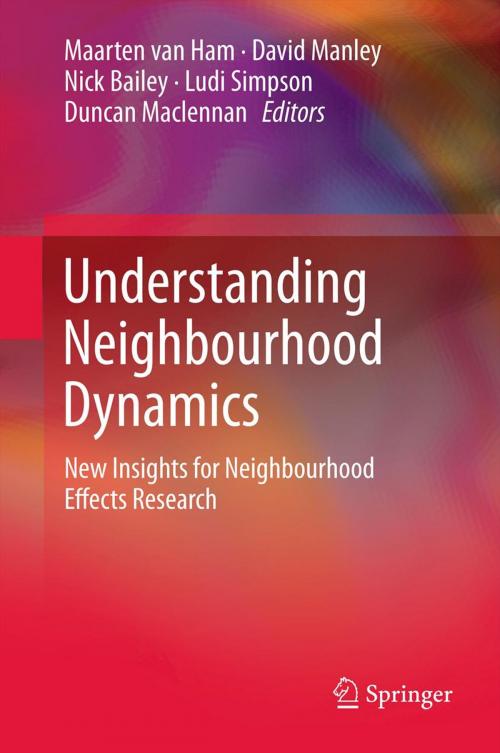Understanding Neighbourhood Dynamics
New Insights for Neighbourhood Effects Research
Nonfiction, Social & Cultural Studies, Social Science, Human Geography, Health & Well Being, Medical, Science & Nature, Science| Author: | ISBN: | 9789400748545 | |
| Publisher: | Springer Netherlands | Publication: | September 26, 2012 |
| Imprint: | Springer | Language: | English |
| Author: | |
| ISBN: | 9789400748545 |
| Publisher: | Springer Netherlands |
| Publication: | September 26, 2012 |
| Imprint: | Springer |
| Language: | English |
This rare interdisciplinary combination of research into neighbourhood dynamics and effects attempts to unravel the complex relationship between disadvantaged neighbourhoods and the life outcomes of the residents who live therein. It seeks to overcome the notorious difficulties of establishing an empirical causal relationship between living in a disadvantaged area and the poorer health and well-being often found in such places.
There remains a widespread belief in neighbourhood effects: that living in a poorer area can adversely affect residents’ life chances. These chapters caution that neighbourhood effects cannot be fully understood without a profound understanding of the changes to, and selective mobility into and out of, these areas. Featuring fresh research findings from a number of countries and data sources, including from the UK, Australia, Sweden and the USA, this book offers fresh perspectives on neighbourhood choice and dynamics, as well as new material for social scientists, geographers and policy makers alike. It enriches neighbourhood effects research with insights from the closely related, but currently largely separate, literature on neighbourhood dynamics.
This rare interdisciplinary combination of research into neighbourhood dynamics and effects attempts to unravel the complex relationship between disadvantaged neighbourhoods and the life outcomes of the residents who live therein. It seeks to overcome the notorious difficulties of establishing an empirical causal relationship between living in a disadvantaged area and the poorer health and well-being often found in such places.
There remains a widespread belief in neighbourhood effects: that living in a poorer area can adversely affect residents’ life chances. These chapters caution that neighbourhood effects cannot be fully understood without a profound understanding of the changes to, and selective mobility into and out of, these areas. Featuring fresh research findings from a number of countries and data sources, including from the UK, Australia, Sweden and the USA, this book offers fresh perspectives on neighbourhood choice and dynamics, as well as new material for social scientists, geographers and policy makers alike. It enriches neighbourhood effects research with insights from the closely related, but currently largely separate, literature on neighbourhood dynamics.















